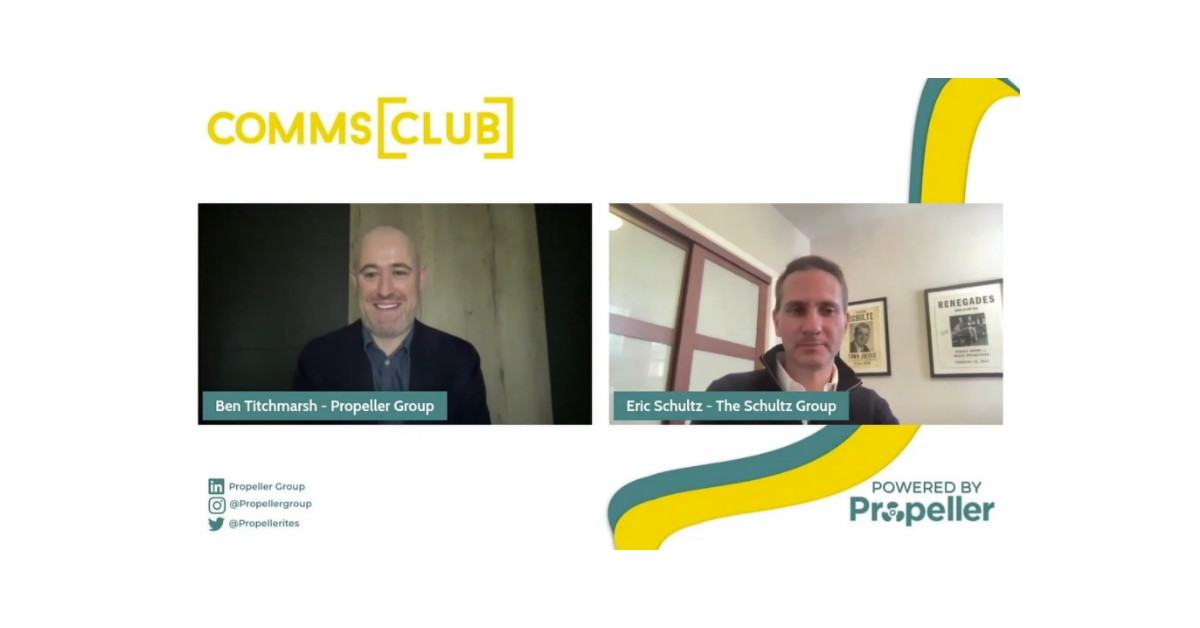Comms Club: The Big Issues – From the eye of the storm: comms lessons from President Obama’s Deputy Press Secretary

What does it take to handle being in the full glare of the media spotlight and how do you handle a constant barrage of journalist’s queries?
One comms professional who has been there, done and has a bucket-load of insight and advice to share as a result is Eric Schultz, Former White House Principal Deputy Press Secretary under President Obama and CEO of The Shultz Group.
Eric’s discussion at our virtual Comms Club event with Propeller Director of Partnerships Ben Titchmarsh made compelling viewing.
He explained how he joined the president’s team in Spring 2011 aged 34 and managed the Administration proactive messaging and news-of-the-day responses. He is one of the select few comms professionals who has spoken from Air Force One and the White House briefing room.
Before joining the White House staff he spent nearly a decade working for U.S. Senator, including as Communications Director for the current Democratic Leader Charles Schumer. He is also a veteran of numerous state-wide and national campaigns, including as New Hampshire Communications Director for John Kerry’s 2004 presidential campaign and Deputy Campaign Manager for Al Franken’s 2008 Senate race.
The special relationship (with the press)
Eric spelt out the day-to-day role: “It was mostly unglamorous, working with reporters and trying to get the President’s message across to as wide an audience as possible, and handle the incoming questions from a notoriously aggressive and relentless press corps.”
Eric admitted that dealing with the press can be frustrating and said: “I’ve lost my temper plenty of times with reporters but every time I regret it – it’s about understanding they have imperative and a job to do and recognising that the newspaper is going to come out tomorrow and it’s going to come out the next day and the day after that and the most important element I determined for my success was credibility.”
He added: “We certainly put our spin on the ball but I don’t think reporters would ever suggest I intentionally misled them or was deceitful in any way.”
On the podium
Taking to the press briefing podium was the “honour of a lifetime” said Eric and added: “I am an evangelist for the press briefing and a fan of that podium – it’s stake in the ground for democracy. Having one of the President’s top advisors go live on camera to answer the questions is an important signal to send around the world about holding ourselves accountable.”
He did stress that what viewers saw or read was not just the White House press team “speaking off the cuff.” He pointed out that when speaking in the briefing he was representing the entire Administration or even the country and this meant “It cannot just be the press team thinking about how they want to answer something. It’s the product of an inter-agency process, a pretty robust system.”
The President’s Poker face
Of course, Eric shared some anecdotes about working under President Obama (whom he still advises as a consultant), calling him “Brilliant but kind and thoughtful, given who he is and stature does not have to be so kind but he is.”
He pointed to the President’s penchant for card-playing and said that on many long AirForce 1 flights he was “volunteered” to play cards with his boss. “It’s one thing feeling the pressure briefing the press from the White House podium, it’s another to be the President’s partner in a card game that is important to him.”
Eric’s 5 pieces of invaluable advice
- Before a broadcast opportunity do your homework. “Have a good sense of what you’re stepping into. It’s so busy right now with things coming at us and so much happening. Pause, take a moment to figure out what set up and what is the one takeaway your want to be conveyed. Be reminded given breathlessness nature of media and our work got to slow down and realise what doing in that moment.
- Establish a relationship with journalists. “It comes down to building relationships to the extent that when moments get hot there’s a basic level of understanding and trust. That foundation is hard to build in a moment – you have to spend a lot of time in advance.”
- When briefing someone for interview provide time to rehearse. “Even saying it in your head is very different from reading it out loud. Allow people to practice and hear [the material] out loud – and then you as comms director can tweak it and tinker with it.”
- When there’s a crisis be the adult in the room. “Things will be moving so fast and vigorously and a lot of the information can be chaotic and unverified but you want to be seen as credible, empathetic and transparent. Moment starts to get swept up in the swirl you run the risk of losing your stature in the middle of a story. Being the calm adult in the room in the midst of chaotic frenzy will serve you well.”
- When there is a problem be clear what you are doing to fix it. Eric gave the example of the roll out of the Healthcare.gov website, launched on the back of the President signing the Affordable Care Act. The website went down a number of times. “That was a real moment for me to realise that not only do you have to be credible and empathetic but clear what doing to fix the problem.”
To read the key takeaways from other Comms Club: The Big Issues sessions click the below links:
Getting boardroom buy-in for PR pushes
Leadership life stories: How to craft a compelling narrative for your company
Can companies communicate both purpose and profit?
You can view the full panel by clicking here.